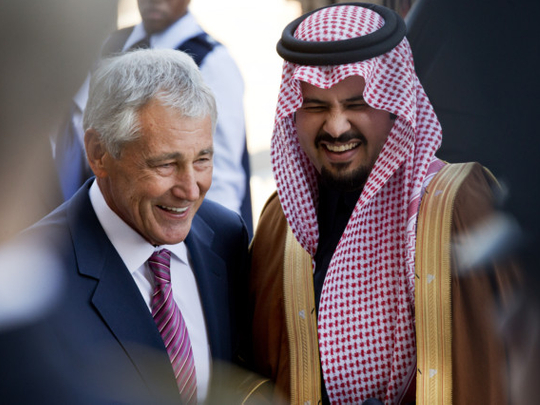
Washington: Defence Secretary Chuck Hagel hosted Saudi Arabia’s deputy defence minister for talks Thursday, reaffirming US military ties to Riyadh despite discord over Washington’s Iran and Syria policies, officials said.
While Hagel made clear to Prince Salman Bin Sultan that the US would continue its diplomacy with Iran, he underscored the importance of US-Saudi military cooperation, a defence official said.
Saudi Arabia harbors grave reservations about attempts by Washington and other major powers to negotiate a deal with Iran over its nuclear programme, but “Hagel stressed our position on Iran has not changed,” said the senior US official.
The official said the two discussed tensions among Gulf states, as Qatar has angered Riyadh and other members of the Gulf Cooperation Council over its support for the Muslim Brotherhood in the region and harder line extremists in Syria.
“The two leaders reaffirmed the strength of the US-Saudi relationship, with Secretary Hagel emphasising the commitment of the United States to security in the region,” Pentagon spokesman Rear Admiral John Kirby told reporters.
“They also discussed regional challenges and the importance of regional cooperation in addressing common security issues.”
Prince Salman earlier met Deputy Secretary of State William Burns during his first visit to Washington since taking over as deputy defence minister in August.
The son of late crown prince and veteran defense minister Sultan Bin Abdul Aziz who died in 2011, he previously served in the Saudi embassy in the US capital.
The Obama administration’s diplomatic opening with Iran and its reluctance to intervene in the Syrian conflict have frustrated the Saudi leadership and caused serious tensions in the decades-long strategic alliance.
The Saudis are sceptical of the interim nuclear deal with Iran negotiated by major powers, viewing it as a risky venture that could embolden their Shiite-led rivals in Tehran.
And the Saudis were bitterly disappointed over Obama’s eleventh-hour decision last year to back away from military action against the Syrian regime.
Saudi Arabia spends billions of dollars every year on US weapons but officials said no specific arms deals were discussed in Thursday’s talks.
The US government has approved more than $86 billion (Dh315 billion) in weapons sales to Saudi Arabia since 2010, including a fleet of upgraded F-15 fighter jets, Apache attack helicopters, an array of missiles, Patriot batteries and other hardware.












